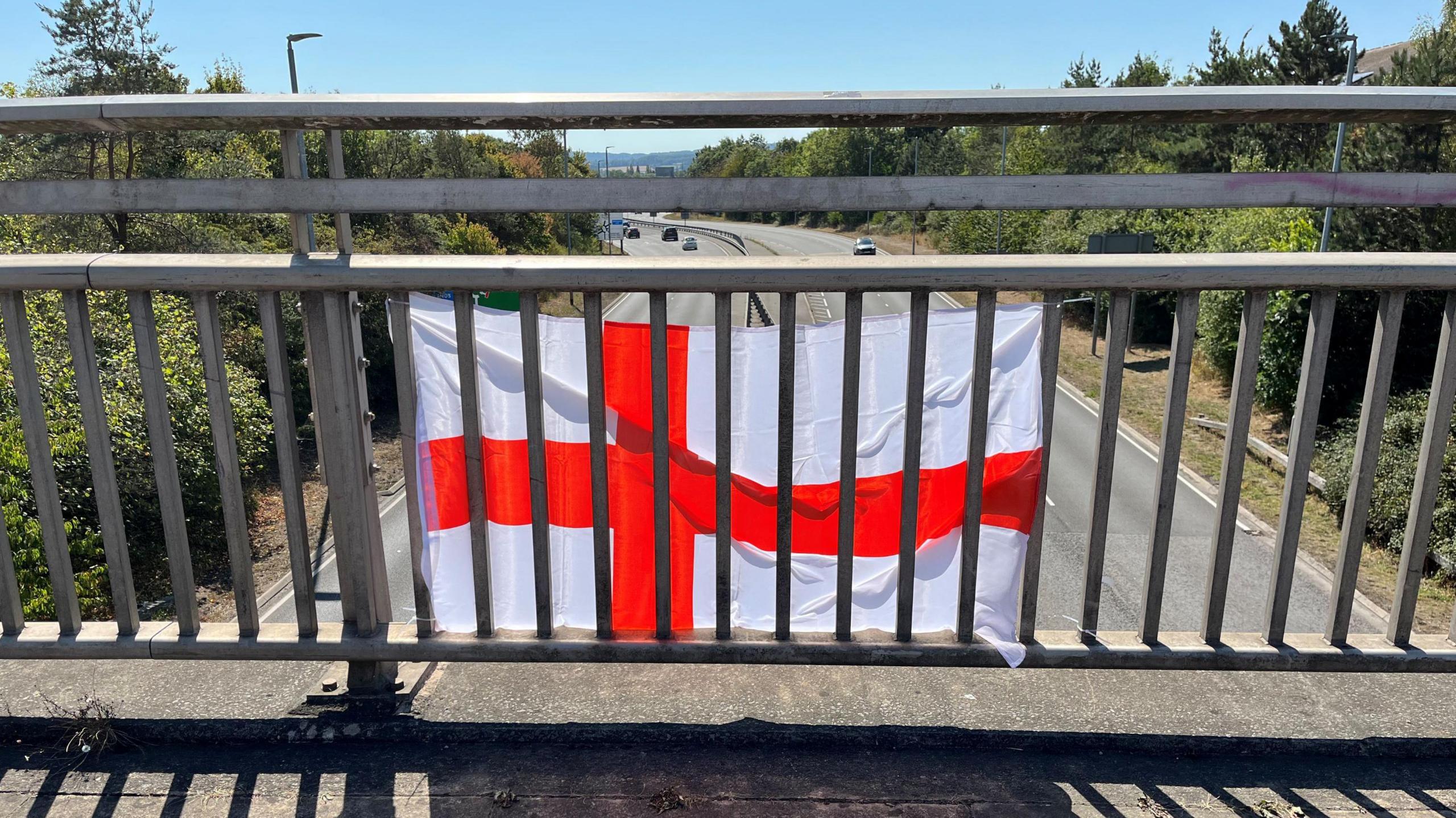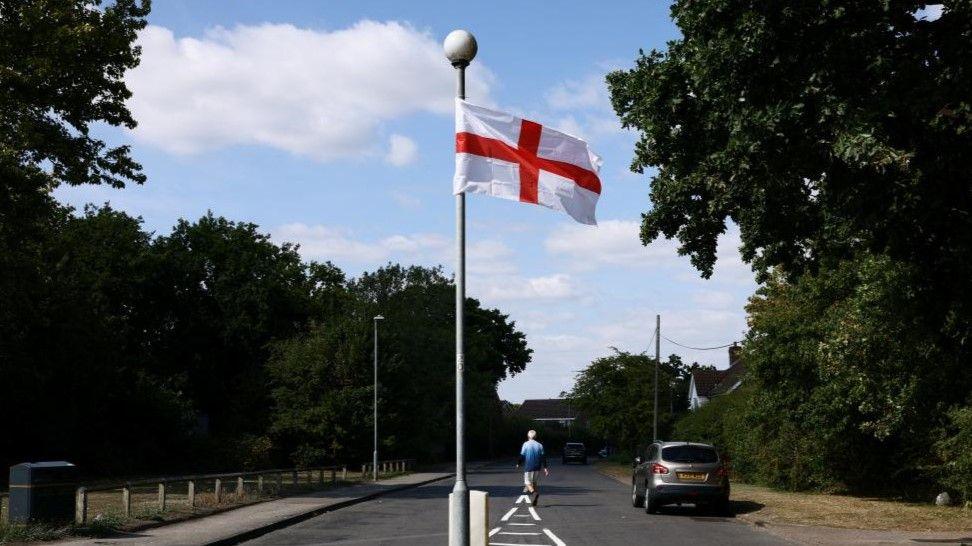'We're proud to spend £200 to put up flags'
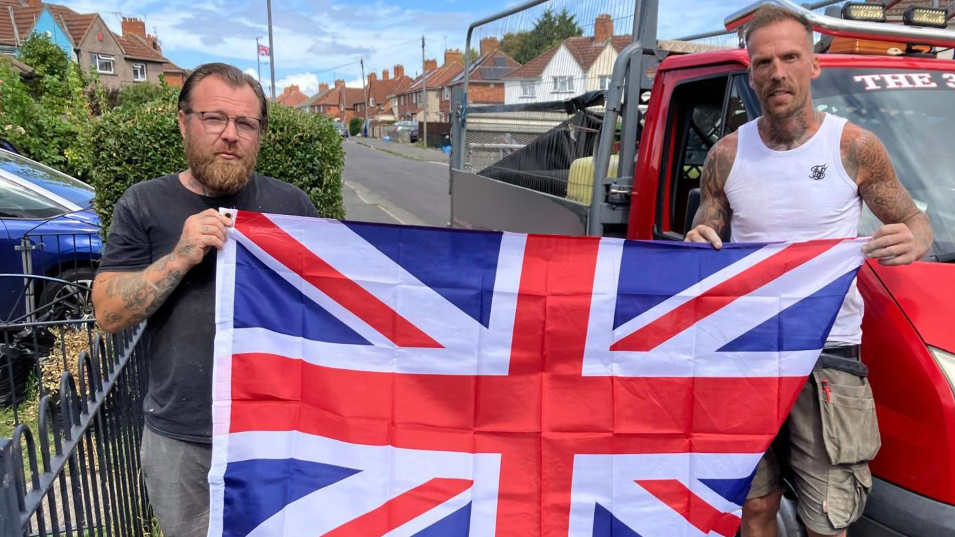
Lee (L) and Matt say locals are asking them to put up more flags in Knowle West, Bristol
- Published
As St George's and union jack flags continue to appear in communities across the UK, some say they are putting them up because they are "proud to be English".
The flags, often associated with national sporting occasions, are viewed by many as a symbol of respect, patriotism and celebration.
Tradesmen Lee and Matt said they splurged £200 on flags and spent three hours per night installing them across the Knowle West area of Bristol.
They say locals have been very supportive, encouraging them to put up more.
But the appearance of flags across England is not universally welcomed.
They come at a time when tensions are running high over immigration.
Some associate the flags with the far right and one charity says they are making people feel "unwelcome".
On Saturday, a group of about 50 anti-immigration protesters carrying English and British flags in Bristol city centre was met by a large counter-demonstration.
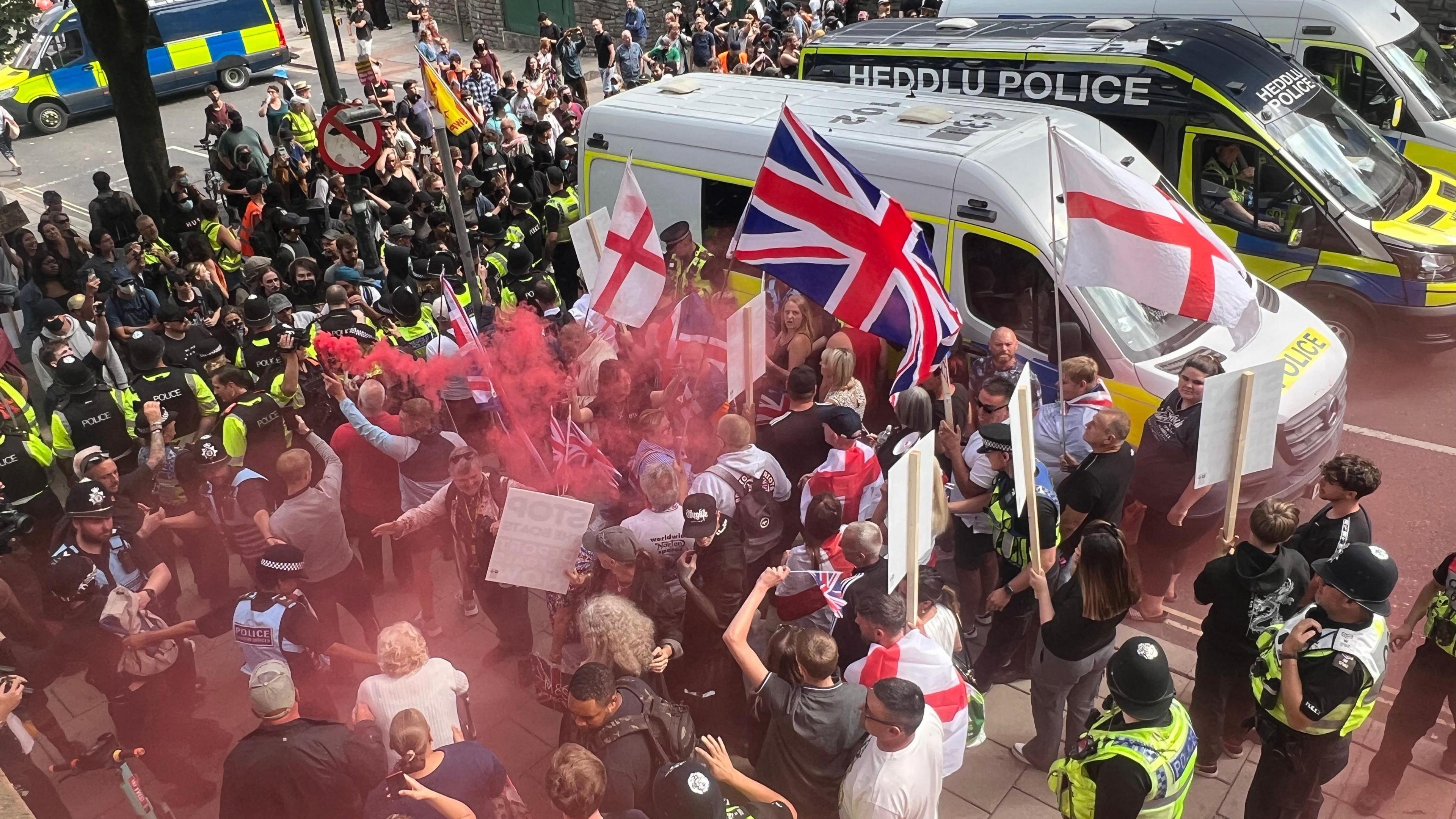
Anti-immigration protesters confront counter-demonstrators in Bristol on Saturday
This protest came two weeks after a similar demonstration outside a hotel housing asylum seekers, and roughly one year after violence broke out between opposing groups across the country following the killing of three children in Southport, Merseyside.
Dr James Freeman, a senior lecturer in political history at the University of Bristol, acknowledged the fact that St George's flags and union jacks have been used as emblems for far-right political movements.
He said it was important to note that the St George's flag was "not the property of the far right", who often "appropriate existing symbols within our culture".
"[Use of the flag] attempts to legitimise their politics and make it part of the accepted national debate," he said.
"In this case, using patriotism as a cover for ethnic nationalism, basically."
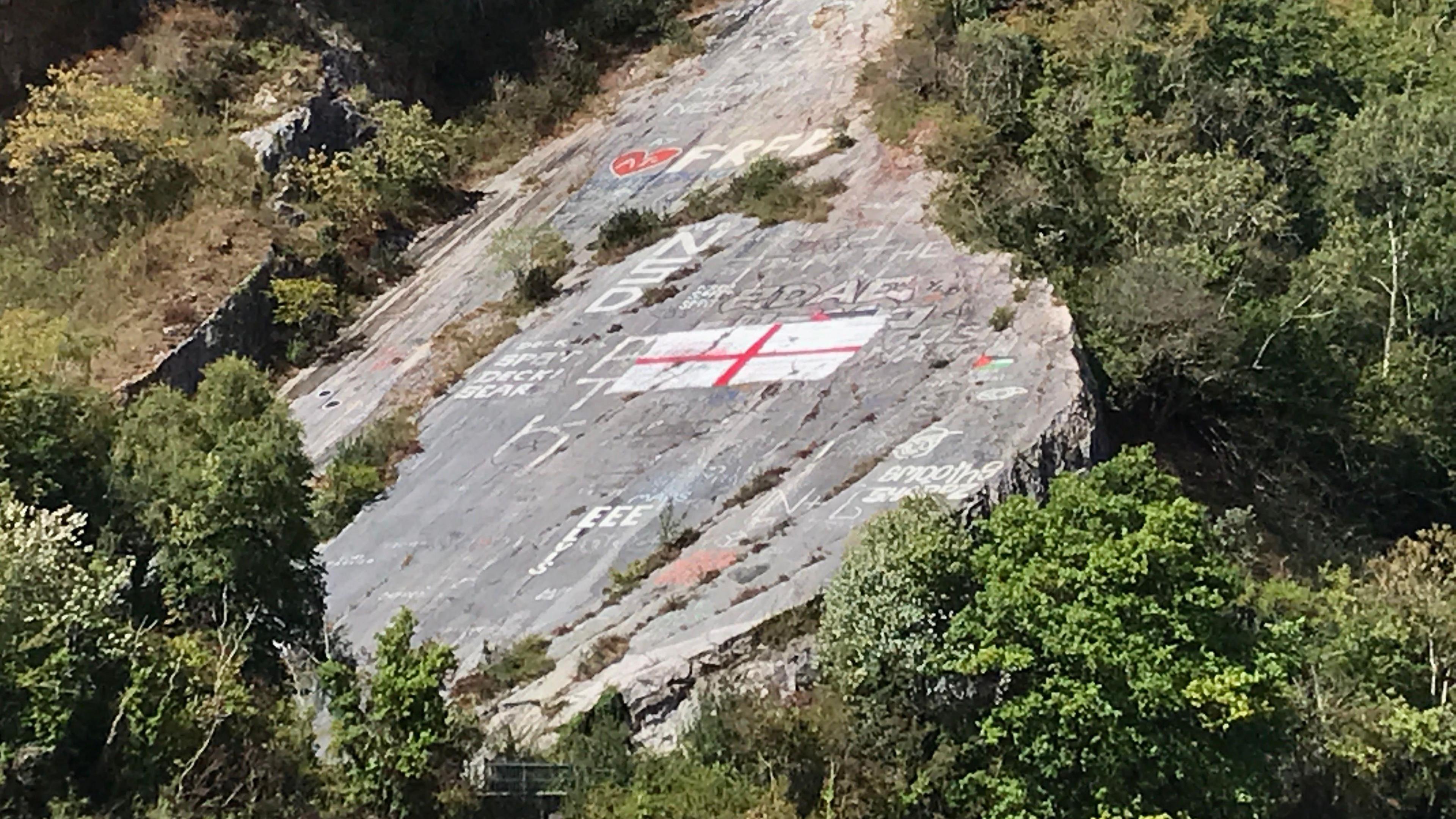
A flag has been painted on the slate at Avon Gorge in Bristol
While many football fans were flying the flag to cheer on the Lionesses during the 2025 Euros, thousands more have been raised in recent weeks.
They have also been painted on signs, roundabouts, zebra crossings and even on the slate at Avon Gorge in Bristol.
Councils across the West of England have said they support the right to fly them, but that crosses painted onto infrastructure and some flags hung near or on roads would be removed for safety reasons.
'Proud to be British'
Knowle West tradesmen Lee and Matt have been finding time to put up the flags alongside their work running a garden and maintenance business together.
The pair, who did not give their surnames, said they felt national pride had slipped in the UK, and they hoped the flag-raising would "make a difference".
"We aren't racist, we're just proud to be British, proud to be English, and we're just showing that," said Lee. "No one's objected yet."
"Everyone's cheering us," Matt added.
"As we put it up, they clap us, they're proud. It's amazing."
But Curtis Arber, in Gloucester, said he felt some people were "misusing the flag", and the St George's cross had "connotations of nationalism".
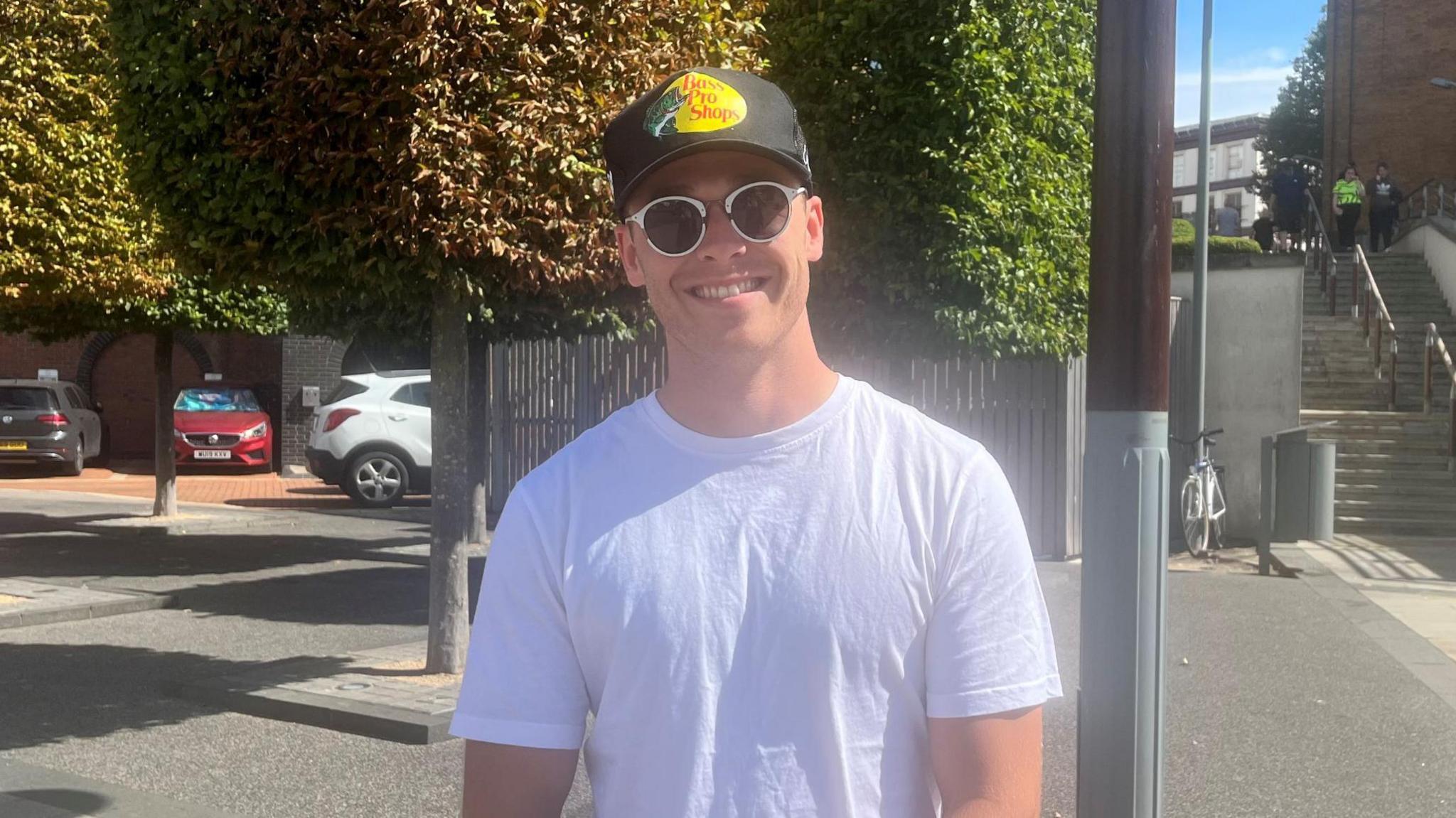
Curtis Arber said he didn't agree with all uses of the flags
"People should be proud of where they come from," Mr Arber said.
"But at the same time, our country was built upon by people coming from all different backgrounds and cultures.
"If it weren't for different cultures and influences over the years, we wouldn't live in the society we do today."
For some charities across the region, there are concerns over the meaning behind the flags.
'Feel intimidated'
A spokesperson from Bristol charity Stand Against Racism and Inequality said that while not every flag was put up "with the intent to divide", they "are making some minoritised people feel less safe, intimidated, and unwelcome in their communities".
The spokesperson added: "We are concerned not only that the flags are causing people to feel afraid, but that they will also embolden those who hold racist views to commit acts of hate."
While most of the painted flags have appeared on road furniture such as roundabouts, a nature board belonging to Wiltshire wildlife group River Warriors Calne was sprayed with a red cross, obscuring information for visitors to Abberd Brook.
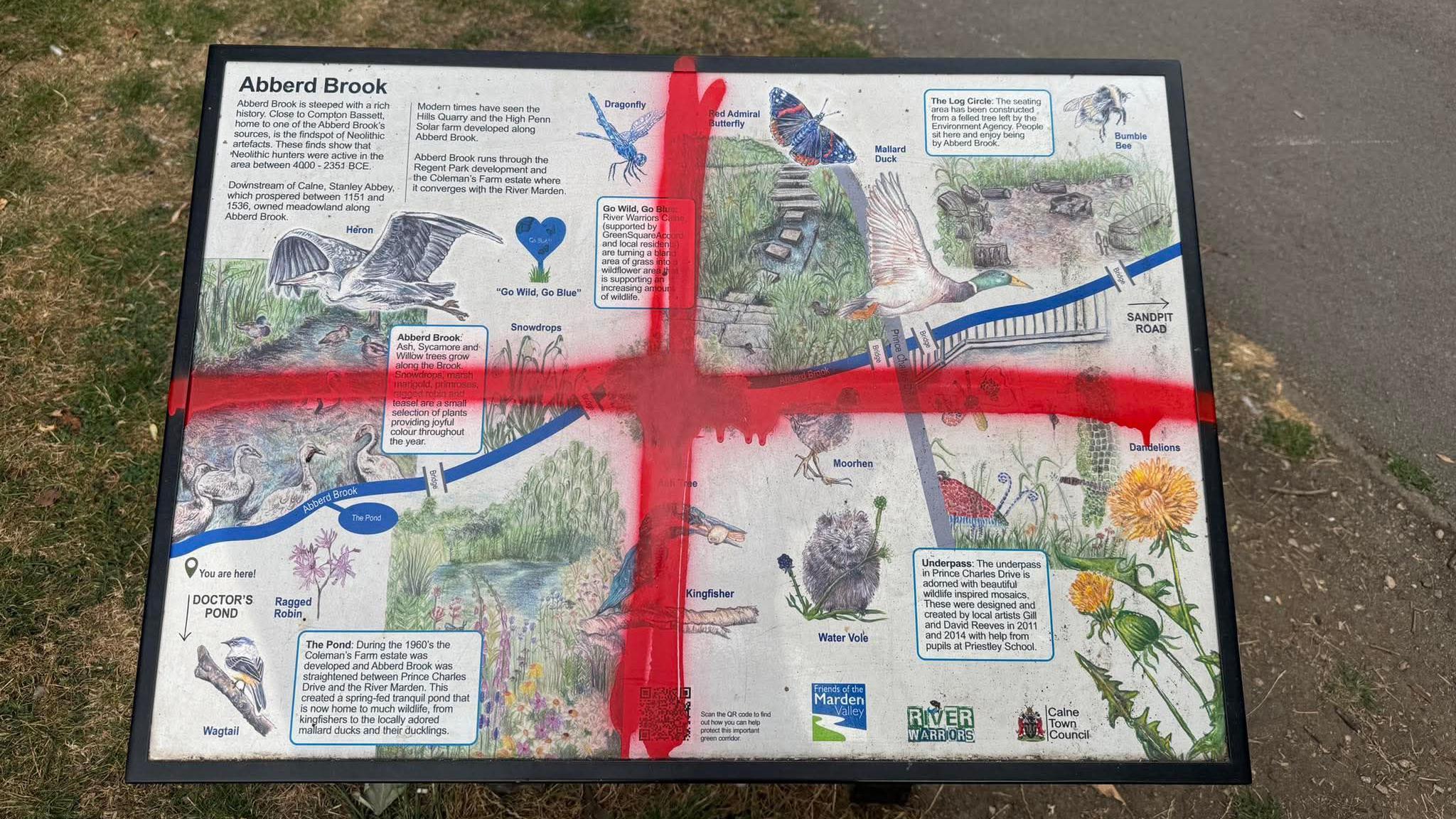
A community group said a red cross sprayed on a nature board was "clear vandalism"
"I was really upset," said the group's founder, Tamzyn Long.
"We're a group of volunteers who put our heart and soul into looking after the area and we'd raised funds to have the sign created.
"This felt like clear vandalism to us, it was really disappointing."
After failed efforts to clean it off, a mysterious good Samaritan removed the paint over the weekend, which Ms Long described as a "lovely surprise".
Martin Smith, of Wiltshire Council, encouraged people to report vandalism to police.
"While those responsible may believe they are drawing attention to road defects or expressing a form of nationalism, this kind of activity constitutes vandalism," he said.
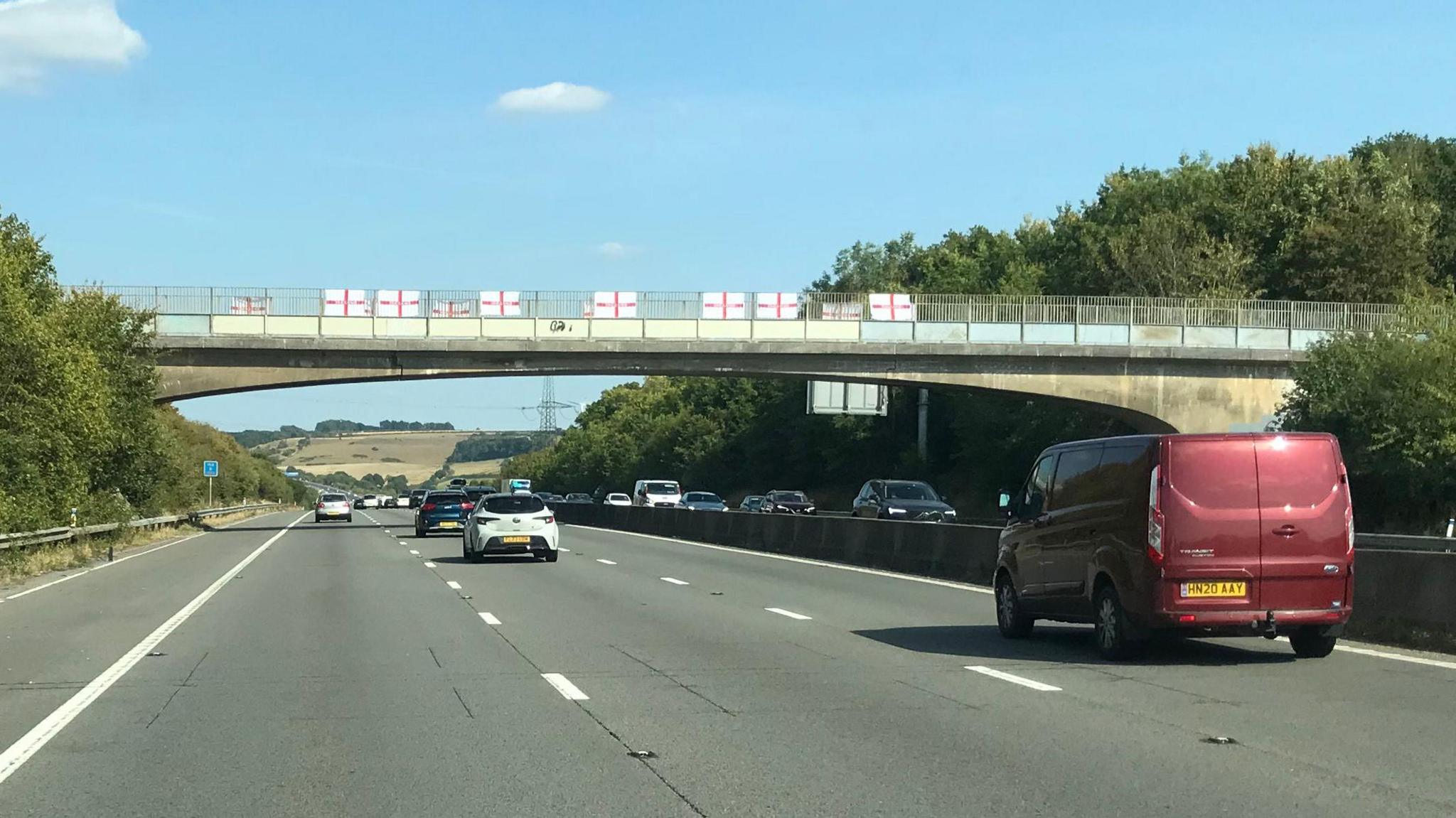
Several flags have appeared over the M4 eastbound out of Bristol
Councils across the West have highlighted it can be costly to remove flags or graffiti, and warned it was a criminal offence to deface road markings.
Several authorities also said there were safety concerns to be considered, as symbols could distract drivers or impact visibility.
National Highways said flags attached to bridges, for example, could "pose a danger to motorists" below.
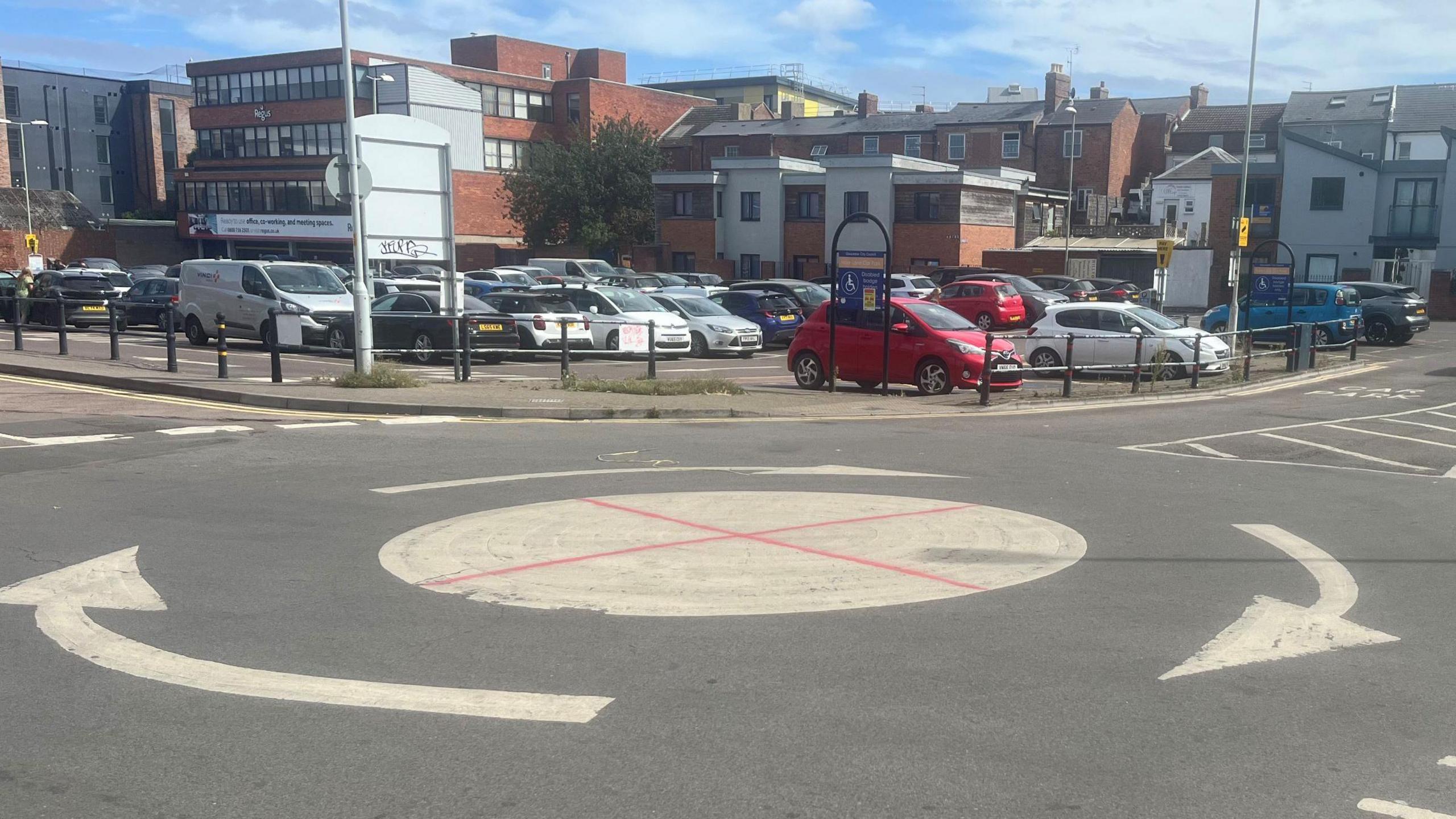
Gloucestershire County Council says markings, such as this one in Gloucester, are "potentially dangerous"
A roundabout painted with a red cross in Gloucester was described as "potentially dangerous" by Joe Harris from Gloucestershire County Council.
He said similar incidents "reduce a national symbol to little more than road markings".
"As someone who used to collect flags, I know how much they mean as symbols of pride and identity," he said.
"They should be treated with care and kept in good condition."
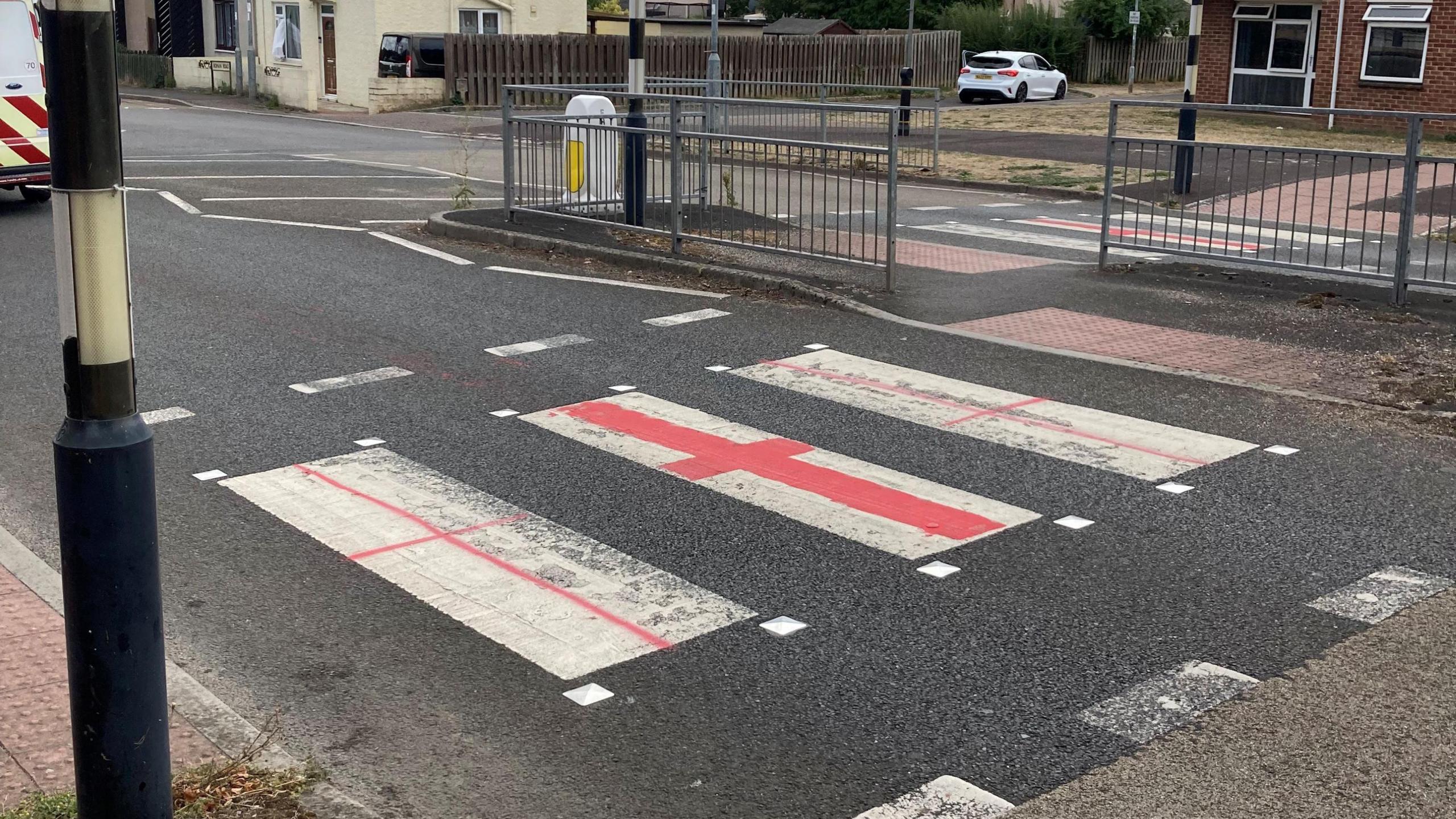
Red crosses were painted on this zebra crossing in Taunton, Somerset
Bristol University's Dr Freeman said the link between the St George's flag and the far right was "relatively recent".
"If you looked back at the British Union of Fascists in the 1930s and the National Front in the 1970s, you find that the main flag used is actually the union jack and that's to do with the dominance of that flag," he said.
But he said the use of flags "to intimidate or demark certain areas as being out of bounds" was a historical phenomenon that "resonates for some people".
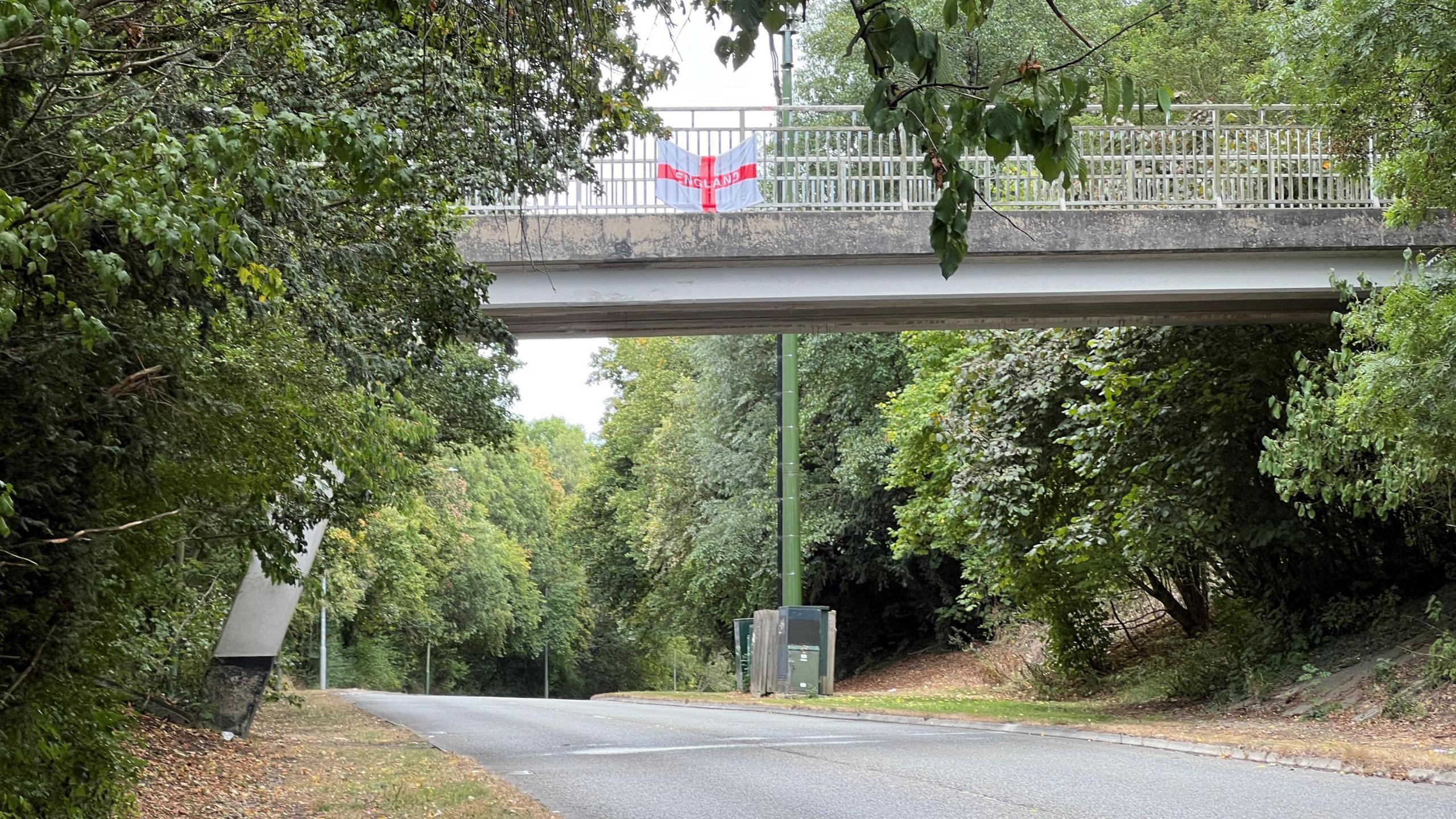
This flag was seen hanging over Tewkesbury Way in Swindon, Wiltshire
He said that, since the 1996 Euros, historians started noticing the St George's flag being used more around sporting events, particularly where UK teams were competing as the four separate nations.
"Having those different identities has been quite a big part of British identity," he said.
Additional reporting by Harriet Robinson and Joe Skirkowski
Get in touch
Tell us which stories we should cover in Bristol
Follow BBC Bristol on Facebook, external, X, external and Instagram, external. Send your story ideas to us on email or via WhatsApp on 0800 313 4630.
Related topics
- Published30 August
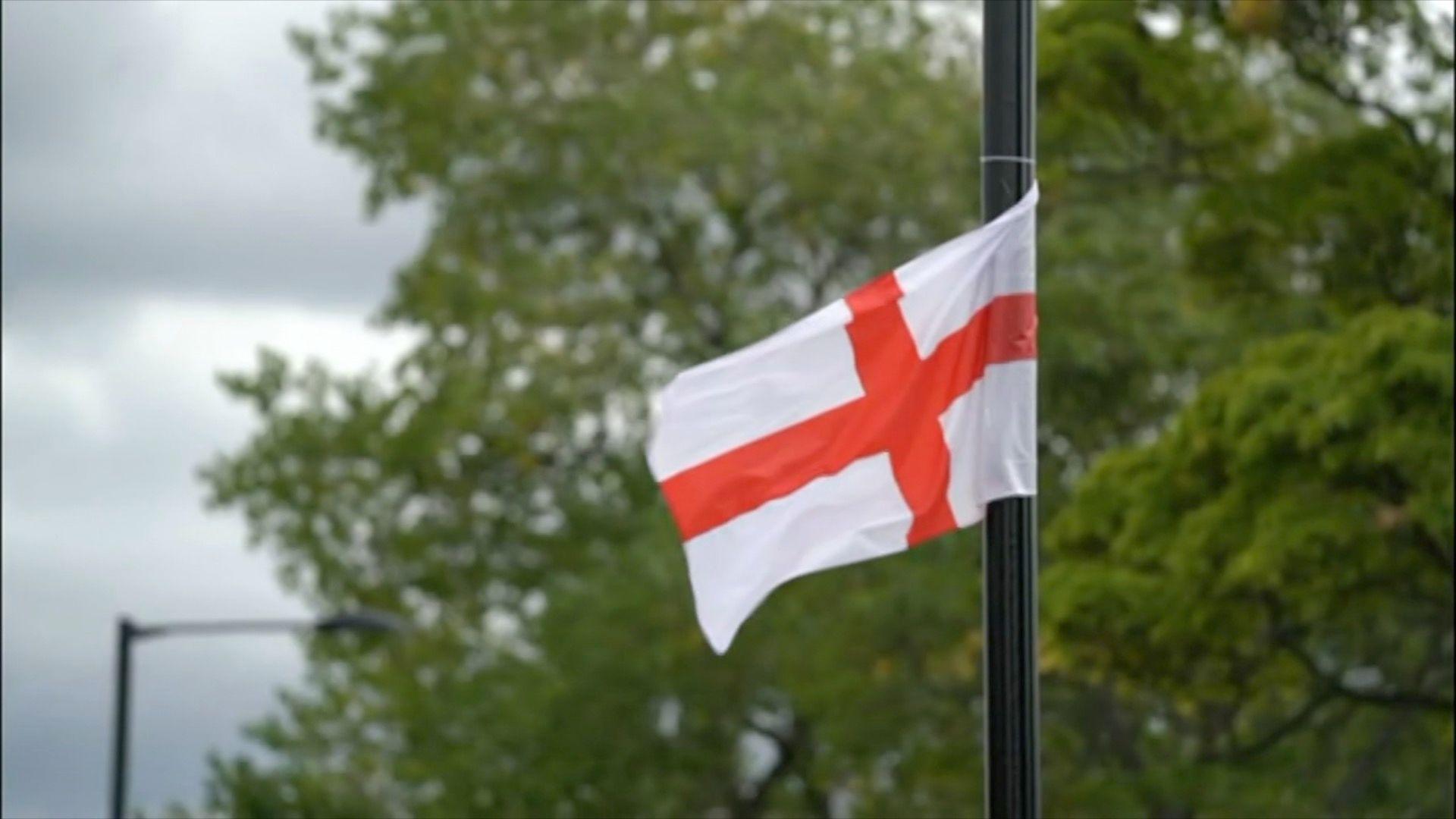
- Published27 August
